You know green spaces are healthy for you. But do writing and gardening go together?
It depends on who you ask.
George R. R. Martin famously said, “I think there are two types of writers, the architects and the gardeners…. And I’m much more a gardener than an architect.”
He was talking about those who outline and those who don’t—the plotters and the pantsers, as it were. An architect plans everything ahead of time. A gardener plants a seed, waters it, and waits to see what comes forth.
Many other writers find similarities between the two activities.
How Writing and Gardening Are Similar
Both require patience, says blogger Karen Pierce:
“Much like the tender beginnings of seedlings need patience, care and love, writing your own work requires the same approach. The scenes you create, the information you share over the course of time will help become the food for thought of the final form of your work, just like all seedlings need care to become majestic plants. To reach the destination at the end of the road, you will need to walk that road first.”
Author Tom Leveen, also an amateur gardener, finds several things about gardening that are similar to writing. One: you can’t rush things:
“It really sucks to pull up what you think is going to be a gorgeous carrot, and instead it’s this little runty pale orange root. Growing food takes time; so does writing a novel…Don’t pull your stories out of the dirt until they’re actually ready to be consumed; don’t show them till they’re ready….Be patient, and keep working. The story and the vegetables will let you know when it’s time.”
Others disagree. Ancient historian and gardening writer Robin Lane Fox calls writing and gardening an “uncomfortable marriage:”
“I have never had an idea for one of my history books or hit on a good phrase while trying to root out bindweed or tidy up roses after flowering,” he writes in the Financial Times. “Gardening is a process that takes about a quarter of an hour to become absorbing. A bout of it can then be therapeutic, but it does not unlock a writer’s brain. It is not punctuated by thoughts about a book. It is punctuated by thoughts about whether it is time for a break.”
Whatever side of the fence you’re on, you may want to try gardening simply for the health benefits.
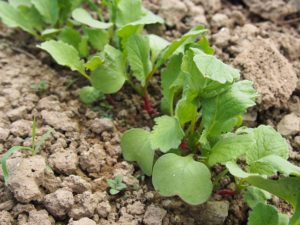 Benefits of Green Spaces: Mood-Boosting Bacteria
Benefits of Green Spaces: Mood-Boosting Bacteria
Is dirt the new Prozac?
Some studies suggest they may be similar.
In 2007, for instance, researchers treated mice with “friendly” bacteria called Mycobacterium vaccae naturally found in soil. They found that the bacteria altered behavior in much the same way as antidepressant drugs.
They activated a group of neurons in the brain that produce the “feel good” neurotransmitter, serotonin.
Might this be a good solution for writers who are feeling rejected, discouraged, or just plain down and out? Could it really be as simple as getting your hands in the dirt?
Lead author Dr. Chris Lowry, said: “These studies help us understand how the body communicates with the brain and why a healthy immune system is important for maintaining mental health. They also leave us wondering if we shouldn’t all be spending more time playing in the dirt.”
He added that you can ingest these bacteria through water sources or by eating plants grown in your own garden.
Fortunately, you don’t have to eat dirt to enjoy the mental health benefits of gardening. Just taking part in the activity—whether you eat the fruits of your labor or not—have been found to boost mood and ease stress.
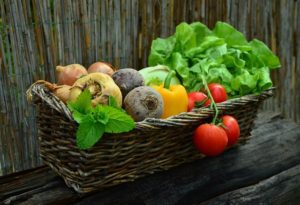 Green Spaces: Have You Tried Horticultural Therapy?
Green Spaces: Have You Tried Horticultural Therapy?
Simply working in a garden has also been found to be uplifting. Some doctors and psychologists use it to help reduce stress and calm the nerves.
Called “horticultural therapy,” it’s thought to help those with post-traumatic stress disorder, depression, anxiety, and other mental health issues.
There are gardens cropping up in prisons, retirement homes, youth detention centers, and veteran homes not only because they’re handy sources of healthy food, but because they can help people feel better.
In a 2011 study, researchers found that gardens helped kids in a juvenile center improve their self-esteem and better manage their emotional and behavioral problems.
The American Horticultural Therapy Association (AHTA) states that gardening helps people heal.
Mitchell Hewson, Canada’s first registered horticultural therapist, notes that most anyone can benefit from horticultural therapy.
“Horticultural therapy stimulates thought, exercises the body and encourages an awareness of the external environment,” he says. “Moreover, the clients who have benefited from this type of therapy report a renewed desire to live, decreased anxiety and improved self-worth.”
Green Spaces Reduce Stress
Studies have found repeatedly that gardening reduces stress—something that writers are all too familiar with.
The process of simply working with plants, being around the greenery, being in the fresh air, and working your body can all help reduce stress hormones and ease the mind.
In one study out of the Netherlands, for example, scientists compared the effects of 30 minutes of gardening to 30 minutes of reading. Results showed that participants who had gardened reported being in a better mood and had lower levels of stress hormones than those who had read.
“When you sit at a desk all day, there’s something about literally putting your hands in the dirt, digging and actually creating something that’s really beautiful,” says Gillian Aldrich, a magazine editor in Maplewood, New Jersey. “There’s something about just being out there that feels kind of elemental.”
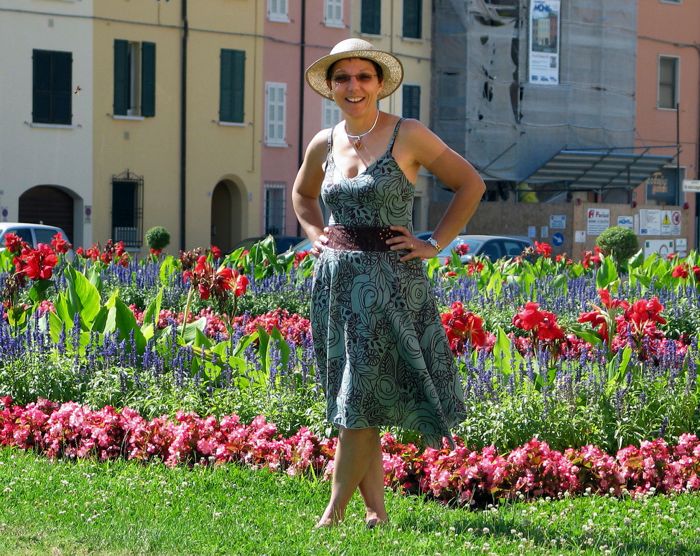 Gardening Can Get a Writer Moving
Gardening Can Get a Writer Moving
Writers spend hours at the desk, or in a chair with a laptop. However we get words on the page, we’re usually sitting, which is bad for our health.
Gardening could be the solution. It’s good exercise, considered a moderate to heavy form of physical activity.
In a 2000 study, gardening was linked to improvements in blood pressure and cholesterol levels. An earlier 1991 study also found that gardening motivates people to stay active longer than other activities, like walking. Participants spent 225 minutes a week in their gardens as opposed to 160 minutes per week walking or 170 minutes per week biking.
A more recent 2013 study out of Stockholm of nearly 4,000 60-year-old participants found that regular gardening could cut the risk of heart attack or stroke and prolong life by as much as 30 percent. Even those who trained for marathons failed to have a lower risk! 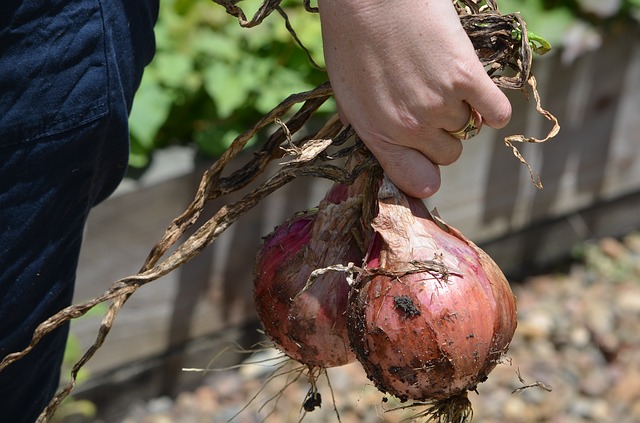 Even the Centers for Disease Control and Prevention (CDC) states that general gardening qualifies as moderate physical activity, and heavy gardening (involving continuous digging and hoeing) qualifies as vigorous intensity exercise.
Even the Centers for Disease Control and Prevention (CDC) states that general gardening qualifies as moderate physical activity, and heavy gardening (involving continuous digging and hoeing) qualifies as vigorous intensity exercise.
It’s all that digging, weeding, planting, hauling dirt, and clearing spaces that can work your muscles and get your heart pumping. Best of all, people feel like they’re accomplishing something, so they’re more likely to stick with it, as opposed to say, running on the treadmill.
Benefits of Green Spaces: Gardening Can be a Meditative Experience for Writers
There are many other ways that gardening can benefit a writer.
It may help increase your consumption of healthy fruits and vegetables—reducing your risk of disease. Studies have shown that community gardeners and their children eat healthier, more nutrient-rich diets than non-gardening families.
Gardening can be rehabilitative, helping to reduce pain and increase function after surgery or other medical procedures. It boosts the immune system, not only because you’re soaking up vitamin D from the sun, but the friendly bacteria in the soil has been linked to reduced symptoms of psoriasis, asthma, and allergies—all ailments tied to a malfunctioning immune system. 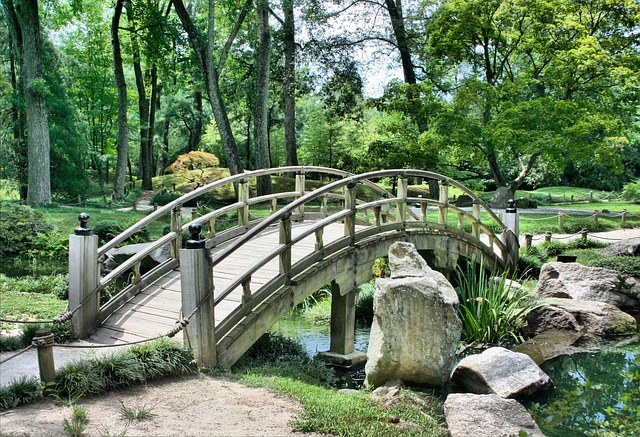 A study out of the University of Texas found that gardeners had consistently higher scores showing “zest for life” and optimism than non-gardeners.
A study out of the University of Texas found that gardeners had consistently higher scores showing “zest for life” and optimism than non-gardeners.
It may even protect your brain, as some studies have found that daily gardening reduced the incidence of dementia by 36 percent.
Perhaps more than anything else, though, gardening can be a sort of meditative, spiritual experience, especially for writers. It connects us to nature and the world around us, which can be extremely therapeutic, especially in today’s world where we’re surrounded by electronic gadgets all the time.
Green Spaces: Would You Like a Garden of Your Own?
Some writers continue to find interesting parallels between writing and gardening.
Both require planting, tending, hard work, patience, and tears sometimes when things don’t come out right.
We have to worry about the details, as well as the big picture, and no matter what we do, sometimes we can’t control the outcome.
We don’t have to compare the two to benefit from the unique interaction between them, though. The truth is that if you don’t enjoy gardening, it probably won’t do you much good to try to grow one. Maybe a few flowers in the bed in front of your house, some hanging plants, or even some houseplants would better suit your lifestyle.
But if you do enjoy gardening, or have wondered if you might, don’t hesitate to get your hands in the dirt this season. It’s never too late to try it.
At the very least it will boost your health and well being, which can’t help but bleed over into your writing process.
Maybe you’ll be like writer Virginia Blackburn, who after growing a few things on an allotment in a small inner-city train station platform, was surprised to find herself wanting to expand her plot.
“Odder and odder, this has made me aware that, for the first time in my life, I’d quite like a garden of my own.”
Are you a writer who loves to garden?
Sources
“Getting dirty may lift your mood,” University of Bristol, April 2, 2007, http://www.bristol.ac.uk/news/2007/5384.html.
Tara Parker-Pope, “Writing Your Way to Happiness,” New York Times, January 19, 2015, http://well.blogs.nytimes.com/2015/01/19/writing-your-way-to-happiness/?_r=0.
Kristofor Husted, “Can Gardening Help Troubled Minds Heal?” NPR, February 12, 2012, http://www.npr.org/sections/thesalt/2012/02/17/147050691/can-gardening-help-troubled-minds-heal.
Julia Savacool, “Health benefits bloom by digging in the garden,” USA Today, May 11, 2014, http://www.usatoday.com/story/news/nation/2014/05/11/health-benefits-gardening/7971047/.
Anne Harding, “Why gardening is good for your health,” CNN, July 8, 2011, http://www.cnn.com/2011/HEALTH/07/08/why.gardening.good/.
“Multiple Benefits of Community Gardening,” Gardening Matters, 2012, http://www.gardeningmatters.org/sites/default/files/Multiple%20Benefits_2012.pdf.
Alexandra Topping, “Gardening as good as exercise in cutting heart attack risk, study shows,” The Guardian, October 28, 2013, http://www.theguardian.com/society/2013/oct/28/gardening-exercise-cutting-heart-attack-risk-diy-60-plus.
Robin Jacobs, “6 Unexpected Health Benefits of Gardening,” Earth Easy, September 19, 2014, http://learn.eartheasy.com/2014/09/6-unexpected-health-benefits-of-gardening/.
Rodale News, “4 Surprising Benefits of Gardening,” MNN.com, October 5, 2012, http://www.mnn.com/your-home/organic-farming-gardening/stories/4-surprising-benefits-of-gardening.
Virginia Blackburn, “From Manolo’s to Mulch! How One City Girl Discovered Her Inner Gardener,” Express, August 18, 2014, http://www.express.co.uk/life-style/garden/500617/Virgina-Blackburn-How-I-discovered-my-inner-gardener.
Photos Woman in Flower Garden: Ravenna – July 2006 – The Wife Posing in the Sunshine via photopin


Well, I love plants, I have many plants in my apartment (unfortunately, I don’t ahve a garden) and tanding to them does relax me. I don’t know whether this makes me a better writer, but it makes me a less stressed one for sure 😉
“Less stressed” is good in my book! :L)